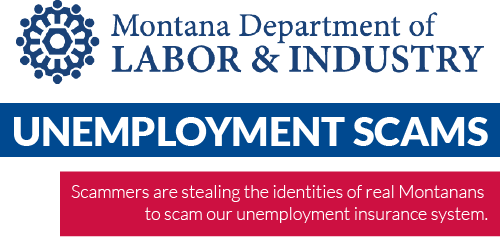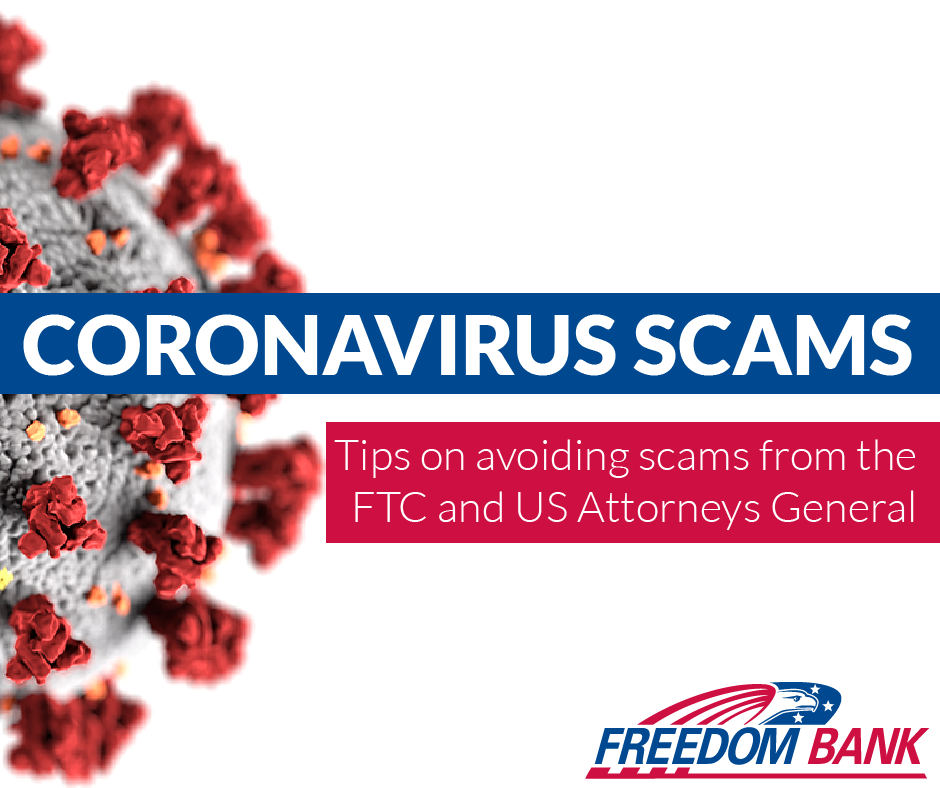Freedom Bank is Focused on You
- (406) 892-1776
- Routing # 092905456
Communities are doing a lot to support one-another in these unprecedented times, but unfortunately scammers are taking advantage of fears surrounding the Coronavirus (COVID-19). Some scams purport to be providing relief or cures. Some scammers are preying on the generosity of people and asking you to donate to victims or relief funds.
Please don’t fall victim to these frauds and crimes. Independently verify the identity of any company, charity, or individual that contacts you regarding COVID-19.
If you see these frauds being attempted or if you are victimized by these frauds, please report them to:
 The Montana Department of Labor & Industry (DLI) announced on June 12th, 2020 that the agency has prevented over $220M in fraudulent Unemployment Insurance (UI) payments since April 28. Scammers are utilizing information obtained from various large-scale data breaches (such as Equifax) to file for fraudulent unemployment claims. If you receive a UI identity verification letter and have not filed for benefits or believe you may be a victim of unemployment or identity fraud to report it at http://uid.dli.mt.gov/report-fraud immediately.
The Montana Department of Labor & Industry (DLI) announced on June 12th, 2020 that the agency has prevented over $220M in fraudulent Unemployment Insurance (UI) payments since April 28. Scammers are utilizing information obtained from various large-scale data breaches (such as Equifax) to file for fraudulent unemployment claims. If you receive a UI identity verification letter and have not filed for benefits or believe you may be a victim of unemployment or identity fraud to report it at http://uid.dli.mt.gov/report-fraud immediately.
In some instances, the FTC says unemployment payments may be sent to the real person instead of the impostor. The criminal may attempt to contact the individual whose information they stole pretending to be a government official and say the funds were sent by mistake.
“If you get benefits you never applied for, report it to your state unemployment agency and ask for instructions,” the FTC said. “Don’t respond to any calls, emails, or text messages telling you to wire money, send cash, or put money on gift cards. Your state agency will never tell you to repay money that way. Anyone who tells you to do those things is a scammer. Every time.”
The Federal Trade Commission’s identity theft website at identitytheft.gov also provides resources and a detailed step-by-step process for reporting and protecting against identity theft.
If you receive calls, emails, or other communications claiming to be from the Treasury Department and offering COVID-19 related grants or stimulus payments in exchange for personal financial information, or an advance fee, tax, or charge of any kind, including the purchase of gift cards, please do not respond. These are scams.

Scammers posing as national and global health authorities, including the World Health Organization (WHO) and the Centers for Disease Control and Prevention (CDC), are sending phishing emails designed to trick recipients into downloading malware or providing personal identifying and financial information.
Scammers are creating and manipulating mobile apps designed to track the spread of COVID-19 to insert malware that will compromise users’ devices and personal information. Watch out for any links texted to your Android phone promising an app to track coronavirus.
Scammers are offering to sell fake cures, vaccines, and advice on unproven treatments for COVID-19. Check reputable sources like the CDC and WHO for factual information about treatments and prevention measures.
Online sellers claim they have in-demand products, like cleaning, household, and health and medical supplies. You place an order, but you never get your shipment. Anyone can set up shop online under almost any name — including scammers.
Scammers are contacting people by phone and email demanding payment for treatment of a friend or relative that they claim was hospitalized for Coronavirus.
Scammers are soliciting donations for false “funds” for individuals, groups, and areas affected by COVID-19.
Scammers are offering online promotions on various platforms, including social media, claiming that the products or services of publicly traded companies can prevent, detect, or cure COVID-19, and that the stock of these companies will dramatically increase in value as a result. These promotions are often styled as “research reports,” make predictions of a specific “target price,” and relate to microcap stocks, or low-priced stocks issued by the smallest of companies with limited publicly available information.
Source: https://www.justice.gov/usao-wdpa/covid-19-fraud-page
Source: https://www.consumer.ftc.gov/blog/2020/03/ftc-coronavirus-scams-part-2